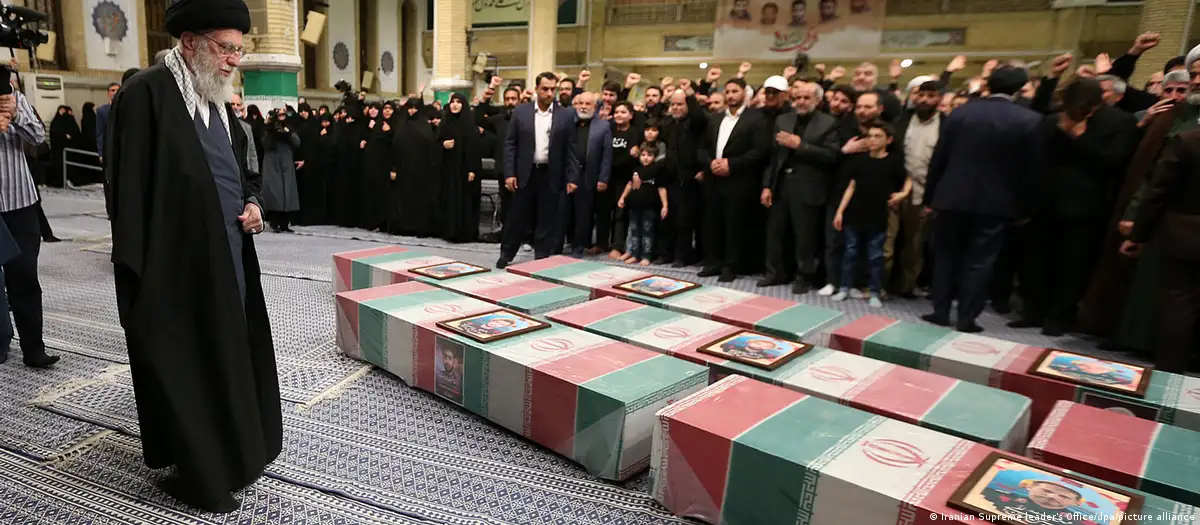The Iranian regime blamed the Israeli government for the airstrike on its consulate in Syria and threatened to retaliate. The two countries have been enemies for decades, but were once close allies in the Middle East.
(DW) Since the start of the war in the Gaza Strip, Israel has also stepped up its attacks on Tehran’s allies in Lebanon and Syria. In this context, at least 13 people were killed in an air strike on the Iranian consulate in Damascus, the Syrian capital, at the beginning of April, including seven high-ranking members of the Iranian Revolutionary Guard. Iran, Syria and Russia blamed Israel for the attack, which has not commented on the incident.
“The attack on an Iranian consulate building was unprecedented. After a long war in the shadows against Iran, Israel seems to have changed its strategy,” Middle East expert Arash Azizi told DW. A professor of history and political science at Clemson University in the US state of South Carolina, he is the author of the book The Shadow Commander, about Revolutionary Guard General Qassim Soleimani, killed by a US drone strike in early 2020, and Iran’s regional ambitions.
Iran’s Revolutionary Guard commanders play a key role in training and funding Hisbollah in Lebanon, which is responsible for several attacks against Israel.
In response to the attack on the consulate in Damascus, the leadership in Tehran threatened to attack Israeli missions abroad. Iran is forced to react to the targeted assassinations of high-ranking Revolutionary Guard officers, says Azizi. “If Iran doesn’t react now, it would mean that Iran has no means of deterrence against Israel.”
At the same time, Azizi assumes that Iran’s reaction will be limited. The country is not seeking a major military confrontation against Israel at the moment, as this could force the US to intervene in the conflict, with unpredictable consequences for Tehran.
Former allies turned enemies
Iran and Israel have been enemies for decades. Tehran denies Israel’s right to exist and threatens the “Zionist regime” with annihilation. Israel, for its part, considers Iran its archenemy. But this was not always the case.
Until the Islamic Revolution in Iran in 1979, the two countries were close allies. Iran was one of the first countries to recognize Israel’s right to exist and its independence in 1948, and saw Israel as a welcome political counterweight to the neighbouring Arab countries.
For its part, Israel considered Iran an ally among the Arab countries in the Middle East conflicts. Israel trained Iranian agricultural specialists, provided technical expertise and helped build and train the Persian armed forces. Iran paid for this with oil, which was urgently needed by Israel during its economic rise.
Iran was once home to the second largest Jewish community outside of Israel. After the revolution, many Jews left the country, but more than 20,000 of them still live there.
Turning point of the Islamic Revolution
After the victory of the Islamic Revolution in Iran and the seizure of power by the religious wing of the revolutionaries under Ayatollah Ruhollah Khomeini, Tehran revoked all treaties with Israel, and Khomeini began to harshly criticize Israel for its occupation of the Palestinian territories.
Tehran gradually developed a harsh rhetoric against Israel with the aim of winning the sympathy of the Arab states, or at least the population of those countries. The Iranian regime sought to increase its own influence in this way.
When Israel intervened in the Lebanese civil war in 1982 and invaded the south of the country, Khomeini also sent Iranian revolutionary guards to Beirut to support the Shiite militias there. To this day, Hisbollah, which emerged at that time, is considered an arm of Tehran in Lebanon.
Iran’s current religious leader, Ayatollah Ali Khamenei, who has the final say in all matters, maintains this policy. Khamenei and the entire leadership of the Islamic Republic of Iran repeatedly question the historical reality of the systematic mass extermination of European Jews in the Holocaust and try to relativize and even deny it.
Policy on Israel is also controversial in Iran
The hostility and hatred of Tehran’s leadership towards Israel is not fully supported by local society. “Iran must re-examine its relationship with Israel, because it is no longer up to date,” said Faezeh Hashemi Rafsanjani in an interview at the end of 2021. She is the daughter of former president Ali Akbar Hashemi Rafsanjani and a former parliamentarian, and emphasized that Muslim Uighurs in China and Chechens in Russia were also being oppressed. “However, Iran has close relations with Russia and China.”
Renowned political scientist Sadegh Zibakalam, who is critical of the government, also takes issue with Iran’s policy towards Israel. “This stance has isolated the country on the international stage,” the Tehran University professor emphasized in an interview with DW in 2022.
However, the hostility towards Israel and the policy of resistance against the major powers have found supporters among the Islamic Republic’s loyal followers.
There is “some frustration” within the regime’s support base, and also regionally in the so-called Axis of Resistance, about Iranian restraint towards Israel in the context of the war in Gaza, Ali Fathollah-Nejad, director of the Berlin-based research institute Center for Middle East and Global Order (CMEG), tells DW. The expert identifies a “high level of frustration with Iran’s lack of credibility as the main supporter of the Palestinian cause, and Iran’s reluctance to confront Israel directly”.
But Fathollah-Nejad estimates that Iran will use its pro-Iranian militias in Syria and Iraq and the Houthis in Yemen to retaliate.
*** TbDCPFYIt ***
